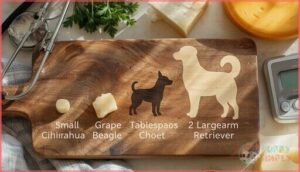This site is supported by our readers. We may earn a commission, at no cost to you, if you purchase through links.
Your dog discovered a wedge of goat cheese on the counter, and now you’re wondering if that impromptu snack was safe. Good news: goat cheese isn’t toxic to dogs, and in small amounts, it can actually be a nutritious treat.
Unlike some dairy products that wreak havoc on canine digestive systems, goat cheese contains less lactose than cow’s milk cheese, making it gentler on sensitive stomachs. But before you start crumbling chèvre into your pup’s bowl, there’s more to take into account.
The high fat content, calorie density, and potential for allergic reactions mean this creamy delicacy requires careful handling. Understanding proper portions, choosing the right varieties, and recognizing when goat cheese doesn’t fit your dog’s dietary needs will help you make the smartest choice for your four-legged friend.
Table Of Contents
- Key Takeaways
- Can Dogs Eat Goat Cheese?
- Nutritional Value of Goat Cheese for Dogs
- Risks of Feeding Goat Cheese to Dogs
- How to Safely Offer Goat Cheese to Dogs
- When to Avoid Goat Cheese for Your Dog
- Frequently Asked Questions (FAQs)
- Is goat cheese ok for my dog?
- Who should not eat goat cheese?
- What is the number one food you should never feed your dog?
- Can a dog eat too much goat cheese?
- Can dogs eat old cheese?
- Can dogs eat cheddar cheese?
- Can dogs eat goat milk?
- Can dogs eat cottage cheese?
- What type of cheese can dogs eat?
- Can dogs have blueberry goat cheese?
- Conclusion
Key Takeaways
- Goat cheese is safe for dogs in small amounts—one tablespoon for medium dogs, just a teaspoon for small breeds—but it’s not a dietary staple because of its high fat and calorie density.
- Plain, pasteurized goat cheese contains less lactose than cow’s milk cheese, making it easier on sensitive stomachs, though dogs with lactose intolerance, weight issues, or pancreatitis should avoid it entirely.
- Skip flavored varieties with garlic, onions, chives, or xylitol, and never offer raw goat cheese since it can harbor harmful bacteria like Listeria and Salmonella.
- Watch for digestive upset, itchy skin, or ear infections after feeding goat cheese, and consult your vet before offering dairy to dogs with chronic health conditions.
Can Dogs Eat Goat Cheese?
Yes, dogs can eat goat cheese in small amounts, but it’s not a straightforward green light. Plain, pasteurized goat cheese won’t poison your dog, though it’s far from an ideal snack for regular feeding.
Just like cooked ham should be limited because of its salt and fat, goat cheese carries similar concerns and shouldn’t become a daily habit.
Before you toss your pup a piece, there are a few important safety considerations you’ll want to understand.
Is Goat Cheese Safe for Dogs?
Plain, pasteurized goat cheese isn’t toxic to dogs and is generally safe when you offer it in small amounts as an occasional treat. Vets view it as a snack rather than a diet staple because it’s calorie dense and can upset your dog’s stomach if overfed.
Soft goat cheese ranks among safer cheese options compared to salty or mold ripened varieties that pose higher risks. Some dogs with lactose intolerance may benefit from the digestive health properties of goat cheese, making it a thoughtful option in moderation.
Recommended Serving Size for Dogs
Portion control matters more than you might think when feeding dogs goat cheese. A medium dog should get no more than one tablespoon as an occasional treat, while small breeds need just a teaspoon.
Extra-large dogs can handle up to two tablespoons, but that still counts toward their daily treat allowance.
Following veterinary guidance on safe feeding tips helps prevent weight gain and digestive upset. For more details on lactose intolerance in dogs, visit this guide to digestive issues from cheese.
Types of Goat Cheese to Consider
Once you’ve settled on the right portion, you’ll want to pick the best variety. Fresh goat cheese logs work well since they’re mild and spreadable, while aged cheese brings nuttier flavors and lower lactose—around 2-3 grams per 100 grams.
Soft ripened types stay creamy under that bloomy rind, but always choose pasteurized cheese over raw varieties to sidestep bacteria risks.
Nutritional Value of Goat Cheese for Dogs
Goat cheese isn’t just a tangy treat—it actually packs a surprising nutritional punch that might benefit your dog in moderation.
Understanding what’s inside this creamy dairy product helps you make informed decisions about whether it fits into your pet’s diet. Let’s break down the key nutrients and what they mean for your dog’s health.
Protein, Fat, and Calorie Content
Goat cheese packs nearly equal amounts of protein and fat, making it an energy-dense treat for your dog. Here’s what each ounce delivers:
Like other calorie-dense treats that can lead to overfeeding, goat cheese should be given sparingly to avoid tipping your dog’s daily calorie balance.
- About 6 grams of protein to support muscle and tissue health
- Around 9 grams of fat, over half saturated
- Roughly 103 calories in soft varieties
- Minimal carbohydrates, so calories come from protein sources and fat metabolism
- High energy density compared to regular dog food by weight
That nutrient balance means calorie intake adds up fast, even in small portions.
Essential Vitamins and Minerals
Beyond protein and fat, goat cheese delivers vitamin A for vision support—around 407 micrograms per 100 grams—plus calcium intake at 298 milligrams to reinforce bone strength.
You’ll also find phosphorus, several B vitamins, and trace minerals like zinc. While these dietary additions sound impressive, remember your dog’s complete food already covers most nutrient deficits, so goat cheese nutrition should complement, not replace, balanced mineral supplements.
Health Benefits for Dogs
Small amounts can offer real advantages. Goat cheese nutrition provides a digestive aid since it holds less lactose than cow dairy—about 4.2 percent—making it gentler on sensitive stomachs.
The balanced protein promotes muscle health, while natural fats contribute to coat shine. Nutritional value extends to quick energy boost during training, and these health benefits make goat cheese a practical canine nutrition option when portioned correctly.
Risks of Feeding Goat Cheese to Dogs
While goat cheese isn’t toxic to dogs, it’s not exactly a health food either. The high fat content, lactose levels, and certain added ingredients can cause real problems for your pup.
Let’s break down the main risks you need to know about before sharing this tangy treat.
High Fat and Calorie Concerns
Even a small cube of goat cheese packs a calorie punch that can throw off your dog’s dietary balance. Semisoft varieties supply around 364 calories per 100 grams, and roughly three-quarters of those calories come from fat—a recipe for weight management headaches and pancreatitis risk.
Even a small cube of goat cheese delivers a calorie-dense punch that risks weight gain and pancreatitis in dogs
- A single ounce delivers about 103 calories, consuming nearly a quarter of a 10-kilogram dog’s daily intake
- Fat content reaches 29 to 30 grams per 100 grams in semisoft types, far exceeding low-fat dog diet guidelines
- Frequent high-fat treats can shift your dog from healthy weight into overweight ranges over months
- Prescription pancreatitis diets keep fat under 18 percent of calories, while goat cheese hits 74 to 76 percent
- Treats should stay under 10 percent of daily calories, making portion control critical for nutrition
Because the calorie density and fat levels in goat cheese conflict with most veterinary nutrition recommendations, you’ll need to keep portions tiny or skip it entirely for dogs prone to weight gain or pancreatic issues.
Lactose Intolerance and Allergic Reactions
Many adult dogs lack enough lactase to break down lactose in dairy, which draws water into their gut and triggers diarrhea or gas within 12 to 24 hours.
Dairy allergies show differently—itchy skin, ear infections, or paw licking from immune reactions to milk proteins. While goat cheese has slightly less lactose than cow cheese, it still challenges lactose intolerant dogs and can spark digestive upset.
Harmful Ingredients in Flavored Varieties
Flavored goat cheese turns a borderline snack into a minefield.
Garlic, onion, and chives cause allium poisoning—damaging red blood cells and triggering weakness or pale gums.
Spicy seasonings irritate your dog’s gut, while artificial preservatives stress the liver over time.
Sweetened varieties may hide xylitol, a sugar substitute that crashes blood sugar fast, or raisins that harm kidneys.
Dangers of Raw Goat Cheese
Raw milk goat cheese can harbor Listeria, Salmonella, and E. coli—bacteria that survive refrigeration and trigger vomiting, fever, and diarrhea in your dog.
Puppies, seniors, and immune-compromised pets face the highest risk of systemic infections. These zoonotic diseases spread to family members through saliva or feces, making raw varieties a public health concern beyond lactose intolerance or pancreatitis dangers.
How to Safely Offer Goat Cheese to Dogs
If you’ve decided to share a small taste of goat cheese with your dog, a few simple precautions can keep the experience safe. The key is knowing which type to choose, how much to offer, and what signs to watch for afterward.
Here’s what you need to do before handing over that first bite.
Choosing Plain and Pasteurized Goat Cheese
When shopping for goat cheese, flip the package and scan the ingredient list for “pasteurized goat’s milk“—pasteurization methods heat milk to at least 161°F, killing harmful bacteria like Listeria.
Plain goat cheese without garlic, herbs, or onion keeps things simple and safe. Check cheese labels carefully, skip flavored varieties, and ask your vet about dairy alternatives if your dog has lactose intolerance.
Proper Portion Control
After you’ve picked a safe cheese, the next step is keeping portion sizes small. Treat frequency matters—most healthy dogs should only get goat cheese a few times a week, not daily.
Calorie limits depend on your dog’s weight: toy breeds need pea-sized bits, while large dogs can handle up to two tablespoons. Weight monitoring and veterinary advice help you tailor feeding guidelines to your dog’s needs.
Monitoring for Negative Reactions
Even small servings can trigger problems in sensitive dogs, so watch for gastrointestinal signs like loose stools or vomiting within a few hours.
Reaction timing helps pinpoint dairy allergies versus lactose intolerance—itching and skin redness often appear days later.
Symptom tracking in a simple notebook makes allergy testing easier if digestive issues persist, and any repeated vomiting or bloody diarrhea warrants emergency care immediately.
When to Avoid Goat Cheese for Your Dog
While goat cheese can be an occasional treat for healthy dogs, it’s not appropriate for every pet. Some medical conditions and individual sensitivities make it a poor choice, regardless of portion size.
Here’s when you should skip the goat cheese altogether and what warning signs to watch for.
Dogs With Weight, Kidney, or Digestive Issues
If your dog struggles with weight management, kidney health, or digestive issues, goat cheese isn’t worth the risk. The high fat and calorie load can stall weight loss or trigger pancreatitis.
For kidney patients, extra phosphorus and sodium stress already compromised organs. Lactose intolerance makes even small amounts problematic for sensitive stomachs.
Always seek veterinary guidance before offering dairy to dogs with chronic health conditions.
Signs of Food Sensitivities or Allergies
Watch for persistent skin irritation—itchy paws, red ears, or hair loss—after your dog eats goat cheese. Digestive issues like vomiting, diarrhea, or gas within 48 hours signal lactose intolerance or food sensitivities.
Recurrent ear infections, hot spots, or behavior changes can indicate ongoing food allergies in dogs. If symptoms follow a pattern each time you offer dairy, your dog’s telling you it can’t handle goat cheese.
Importance of Veterinary Consultation
Veterinary guidance transforms uncertainty into confidence when you’re weighing goat cheese for your dog. A vet reviews your pet’s age, weight, and medical history to decide if dairy fits safely into their diet.
Consultation benefits include:
- Customized portion advice based on your dog’s daily calorie needs
- Early detection of health risks like pancreatitis or kidney disease
- Monitoring plans for lactose intolerance or allergic reactions
- Alternative treat recommendations for sensitive stomachs
- Ongoing support as your dog’s nutrition needs evolve
Safe feeding practices start with veterinary care.
Frequently Asked Questions (FAQs)
Is goat cheese ok for my dog?
Yes, plain pasteurized goat cheese works as an occasional treat for healthy dogs when you keep portions tiny—think pea-sized for small pups, teaspoon-sized for larger ones—though vet approval matters if your dog has digestive sensitivity.
Who should not eat goat cheese?
Individuals with lactose intolerance, dairy allergies, or food allergies should avoid goat cheese entirely.
Those managing sensitive stomachs, pancreatitis risk, or overweight concerns also benefit from skipping it to prevent digestive upset.
What is the number one food you should never feed your dog?
Xylitol toxicity tops every vet’s warning list—this sugar substitute triggers insulin spikes that crash blood sugar in minutes, unlike chocolate poisoning or grape danger, which unfold more slowly yet carry serious risks too.
Can a dog eat too much goat cheese?
Absolutely. Dogs that eat too much goat cheese face digestive issues, dairy allergies, and pet obesity from calorie overload.
A goat cheese overdose can trigger pancreatitis, making canine nutrition balance critical when feeding dogs goat cheese.
Can dogs eat old cheese?
Aged cheese safety walks a fine line—plain cheese varieties won’t poison your dog, but old cheese nutrition brings high fat, salt, and moldy cheese dangers like roquefortine C toxins that trigger spoiled cheese symptoms including tremors and seizures.
Can dogs eat cheddar cheese?
Most healthy dogs can enjoy small bites of plain cheddar cheese as occasional training rewards, but the high fat content raises pet obesity concerns and can trigger cheese allergies or digestive issues in sensitive pups.
Can dogs eat goat milk?
Yes, dogs can have small amounts of plain milk occasionally. It offers digestive health benefits and essential nutrients, but watch for lactose intolerance signs and consult your vet about portion sizes.
Can dogs eat cottage cheese?
Most dogs handle cottage cheese better than goat cheese because it packs less lactose and fat—making it gentler on canine digestion and a smarter pick for dogs prone to dairy products sensitivity.
What type of cheese can dogs eat?
Low-fat mozzarella, plain cottage cheese, and small cheddar cubes work well as occasional treats.
Swiss cheese offers lower sodium, while soft goat cheese remains safe in tiny portions—always choose pasteurized, unseasoned varieties.
Can dogs have blueberry goat cheese?
While not a health disaster, blueberry goat cheese isn’t your smartest pick for canine nutrition.
The added sugars, high dairy fat, and potential lactose intolerance make plain blueberries a safer treat instead.
Conclusion
The myth that all dairy disaster for dogs doesn’t hold up when you look at goat cheese specifically.
Can dogs eat goat cheese? Yes, but success depends on your discernment.
Choose plain varieties, stick to treat-sized portions under 10% of daily calories, and watch for digestive upset.
When you respect your dog’s individual tolerance and health status, this tangy delicacy transforms from dietary gamble into an occasional, protein-rich reward.
- https://dogtime.com/dog-health/dog-food-dog-nutrition/96049-can-dogs-eat-goat-cheese-safe
- https://www.akc.org/expert-advice/nutrition/can-dogs-eat-cheese/
- https://rockanimal.com/articles/can-dogs-eat-cheese
- https://www.dogster.com/dog-nutrition/can-dogs-eat-goat-cheese
- https://www.eatthismuch.com/calories/goat-cheese-134













